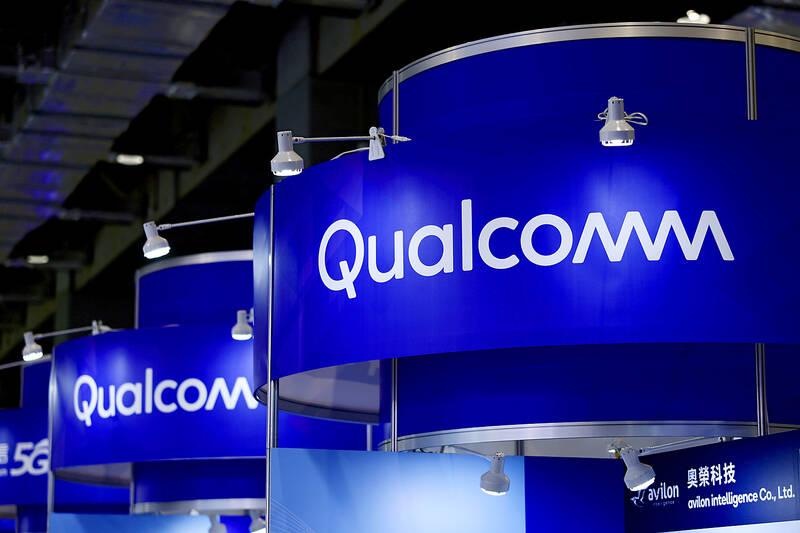Qualcomm Inc, the top maker of mobile phone processors, is entering the lucrative artificial intelligence (AI) data center market with new chips and computers, aiming to challenge Nvidia Corp in the fastest-growing part of the industry.
The AI200 will start shipping next year and be offered as either a standalone component, cards that can be added into existing machines or as part of a full rack of servers provided by Qualcomm. The first customer for the offerings will be Saudi Arabia’s AI start-up Humain, which plans to deploy 200 megawatts of computing based on the new chips starting next year.
Those debut products will be followed by the AI250 in 2027, the San Diego company said yesterday. If supplied only as a chip, the component could work inside gear that’s based on processors from Nvidia or other rivals. As a full server, it will compete with offerings from those chipmakers.

Photo: Ritchie B. Tongo, EPA-EFE
Qualcomm is trying to break into an area that’s reshaped the semiconductor industry, with hundreds of billions of dollars being spent on data centers to power AI software and services. The company said new memory-related capabilities and the power efficiency of designs that owe their roots to mobile device technology will attract customers, despite Qualcomm’s relatively late entry.
The new offerings are built around a neural processing unit, a type of chip that debuted in smartphones and is designed to speed up AI-related workloads without killing battery life. That capability has been developed further through Qualcomm’s move into laptop chips and has now been scaled up for use in the most powerful computers.
Under chief executive officer Cristiano Amon, Qualcomm is trying to diversify away from its dependence on smartphones, which are no longer increasing sales as quickly as they once did. The company has branched out into chips for cars and PCs, but is only now offering a product in what’s become the biggest single market for processors.
Qualcomm has been “quiet in this space, taking its time and building its strength,” Qualcomm senior vice president Durga Malladi said. The company is in talks with all of the biggest buyers of such chips on deploying server racks based on its hardware, he said.
Winning orders from companies such as Microsoft Corp, Amazon.com Inc and Meta Platforms Inc would offer a significant new revenue source for Qualcomm.
The company has posted solid, profitable growth over the last two years, but investors have favored other tech stocks. Qualcomm shares have gained 10 percent this year, lagging behind a 40 percent surge by the Philadelphia Stock Exchange Semiconductor Index.
Nvidia, which remains atop the AI computing world, is on target to generate more than US$180 billion in revenue from its data center unit this year, more than any other chipmaker – including Qualcomm – will get in total, according to estimates.

South Korea’s equity benchmark yesterday crossed a new milestone just a month after surpassing the once-unthinkable 5,000 mark as surging global memory demand powers the country’s biggest chipmakers. The KOSPI advanced as much as 2.6 percent to a record 6,123, with Samsung Electronics Co and SK Hynix Inc each gaining more than 2 percent. With the benchmark now up 45 percent this year, South Korea’s stock market capitalization has also moved past France’s, following last month’s overtaking of Germany’s. Long overlooked by foreign funds, despite being undervalued, South Korean stocks have now emerged as clear winners in the global market. The so-called “artificial intelligence

NEW IDENTITY: Known for its software, India has expanded into hardware, with its semiconductor industry growing from US$38bn in 2023 to US$45bn to US$50bn India on Saturday inaugurated its first semiconductor assembly and test facility, a milestone in the government’s push to reduce dependence on foreign chipmakers and stake a claim in a sector dominated by China. Indian Prime Minister Narendra Modi opened US firm Micron Technology Inc’s semiconductor assembly, test and packaging unit in his home state of Gujarat, hailing the “dawn of a new era” for India’s technology ambitions. “When young Indians look back in the future, they will see this decade as the turning point in our tech future,” Modi told the event, which was broadcast on his YouTube channel. The plant would convert

‘SEISMIC SHIFT’: The researcher forecast there would be about 1.1 billion mobile shipments this year, down from 1.26 billion the prior year and erasing years of gains The global smartphone market is expected to contract 12.9 percent this year due to the unprecedented memorychip shortage, marking “a crisis like no other,” researcher International Data Corp (IDC) said. The new forecast, a dramatic revision down from earlier estimates, gives the latest accounting of the ongoing memory crunch that is affecting every corner of the electronics industry. The demand for advanced memory to power artificial intelligence (AI) tasks has drained global supply until well into next year and jeopardizes the business model of many smartphone makers. IDC forecast about 1.1 billion mobile shipments this year, down from 1.26 billion the prior

People stand in a Pokemon store in Tokyo on Thursday. One of the world highest-grossing franchises is celebrated its 30th anniversary yesterday.